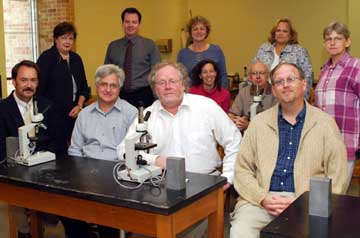
|
|
| Delta State’s Title III Grant Committee members include: (seated, front row, from left) Collier Parker, Dean, College of Arts and Sciences and Professor of Art; Dr. John Tiftickjian, Professor of Biology; Dr. Barry Campbell, Chair Division of Biological and Physical Sciences and Associate Professor of Biology; Dr. Chuck Smithhart, Assistant Professor of Chemistry; (seated back row, from left) Dr. Ellen Green, Assistant Professor of Biology; Dr. Malcolm McEwen, Director of The Center for Science and Environmental Education and Professor of Science Education;(standing, from left) Dr. Myrtis Tabb, Associate Vice President of Finance and Administration; Jeff Slagell, Director of Library Services and Assistant Professor of Library Services; Dr. Beverly Moon, Associate Dean for Assessment & Planning and Associate Professor of English; Beverly Fratesi, Director, Office of Information Technology; Dr. Alina Gabryszewska-Kukawa, Assistant Professor of Physics and Director of Wiley Planetarium. |
Delta State University’s Division of Biological and Physical Sciences is the recipient of a grant from the U. S. Department of Education Title III program. The award, a first in Title III funds for Delta State, provides $2 million in funding over the next five years.
To address barriers to student success in science education, the funds will be directed towards extensive course redesign, faculty development, and equipment. “It’s a tremendous boost for each and every program in the sciences,” says Dr. Barry Campbell, Chair of the Division. “It’s the type of funding that benefits all students coming to Delta State since it impacts the delivery of science instruction to majors and non-majors alike.”


